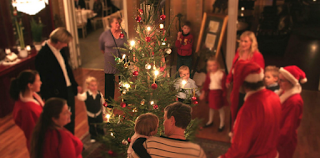A bright star shone above the Earth and three wise men followed
it to their destination. They came
a long way because of the knowledge they had of the events.
They came to meet the Pope, probably
around 400 C.E.
 “The pagans are enjoying Saturnalia way too much” the wise men
told the Pope. “They’re dancing,
singing, giving gifts to friends, burning trees. It’s woefully unbecoming a modern society and a threat to
entice our followers to imbibe in the joyful celebration.”
“The pagans are enjoying Saturnalia way too much” the wise men
told the Pope. “They’re dancing,
singing, giving gifts to friends, burning trees. It’s woefully unbecoming a modern society and a threat to
entice our followers to imbibe in the joyful celebration.”
“You are right,” the Pope agreed. “We must do something to ensure that we can maintain our
control.”
Pope vs. Pagan Headgear
Therefore, the Pope and his followers came up with a plan.
They began to promote a celebration of Christ (Christ-Mass)
during the same time as Saturnalia.
When asked why have a celebration, they explained that it was to
celebrate Christ’s birth.
The pagans were skeptical at first. “Didn’t you say Christ was born in the spring? Around March?” one asked. “I heard the Pope say he was born in August,” another chimed
in helpfully.
The Pope said he had made a mistake, due to the change in
the calendar system to the more modern Julian one. Christ was indeed born in December, the Pope assured everyone.
The pagans still didn’t like it.
“Saturnalia is fun.
We get gifts, we have this cool tree, there’s dancing and singing,” they
said.
“You can still do that,” the Pope professed. “It’s a birthday party after all, isn’t
it?”
So the pagans began to celebrate both holidays, but as more
and more were convinced to switch over to Christianity, Saturnalia fell out of
favor. However, those pagans who
still celebrated their cherished Saturnalia swore they’d take it back.
It took longer than they expected, but slowly and surely,
the pagans have regained control of their celebration.
The pagans made their biggest push in
the 1950s and 60s by adding massive parades and celebrations to the winter
festival. They also brought in
more symbols from other pagans beliefs, such as a rotund, bearded man giving
gifts, and instead of burning logs as in the days of yore, they added colorful
lights to the trees they dance around.
Through the 70s and 80s they advocated for more consumerism
via bigger and better gifts. Spellbinding
advertisements for big, shiny cars and glittery jewels predominate the
airwaves. “Buy more! It will prove
your love,” they proclaim.
So today the pagans have taken back the holiday—but have
cleverly decided to keep it under the title “Christmas.”
The celebration keeps getting expanded too, now beginning on
the Friday after Thanksgiving (Pagan Black Friday) and continuing through New
Year's. There are competitions to
have the biggest tree and brightest light displays. Children are taught that the best gifts are the most
expensive and the ones hardest to acquire. In addition, of course, there are large gatherings to sing
and perform in celebration of the holiday.
It has been a subtle takeover by the pagans, but they have
finally reclaimed what was theirs.
So far, the Pope has not responded.
The Thurber Brigade wishes everyone a Happy Holiday—no matter which one you celebrate!

































